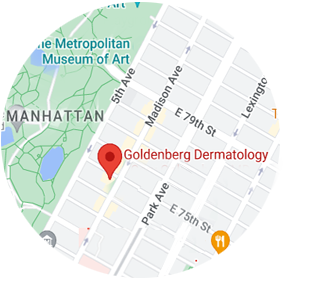Hair Loss: Telogen Effluvium vs. Androgenetic Alopecia
Hair Loss: Do I Have Telogen Effluvium Or Androgenetic Alopecia?
Androgenetic Alopecia and Telogen Effluvium are the two most common conditions for which people seek hair loss treatment. Since many people frequently attempt to self-diagnose the cause of their hair loss, these two conditions are frequently confused. In this article we discuss some of the differences between these two types of hair loss.
Keep in mind, however, that hair loss is a medical condition. So, rather than diagnosing oneself patients should schedule a consultation with board certified Manhattan dermatologist Dr. Gary Goldenberg. We offer a variety of hair loss treatments at our New York, NY practice, and will gladly help any patients in the Manhattan area identify which type of hair loss they have and which treatment is best for their condition.
With that in mind, we will discuss the differences between Telogen Effluvium (TE) hair loss and Androgenetic Alopecia hair loss.
TE Hair Loss Improves with Time
While waiting for Telogen Effluvium (TE) hair loss to improve can be a slow, frustrating process, the good news is that it usually will improve with time. Most cases of Telogen Effluvium hair loss see significant improvement over the course of 6 to 9 months.
Patients suffering from Androgenetic Alopecia hair loss, on the other hand, will usually see a worsening of hair density over a period of 12 months. Without the patient also having undergone hair loss treatment, the best case scenario would be for their Androgenetic Alopecia hair loss to simply remain the same, rather than worsening.
So if your hair loss is improving it may be TE! But if the hair loss is worsening it is quite possibly Androgenetic Alopecia. However, other medical conditions can also cause hair loss to worsen, as well. So a visit to our Manhattan office is the best course of action.
Hair Loss Location is a Clue
Hair loss caused by Androgenetic Alopecia is marked by less density in the front and top middle of the scalp. Telogen effluvium, on the other hand, sees hair loss occur equally throughout the skull, with density visibly decreased throughout the entirety of the scalp.
During their consultation with Manhattan board certified dermatologist Dr. Goldenberg, patients will be examined for their hair loss pattern to determine whether their hair loss is a result of Telogen Effluvium or Androgenetic Alopecia.
Follicle Miniaturization in Androgenic Hair Loss
A hair loss expert like board certified Manhattan dermatologist Dr. Goldenberg can also examine the patient’s scalp, carefully observing the location of the hair loss, to determine whether or not follicle miniaturization has occurred. Follicle miniaturization refers to the process by which the diameter of the patient’s individual hairs becomes incrementally thinner over time, and is a common feature of androgenetic alopecia hair loss.
While miniaturization of follicles can be difficult to identify in the earliest stages of Androgenetic Alopecia hair loss, it will begin to become more apparent over time with this condition. Miniaturization will not, on the other hand, occur in cases of Telogen Effluvium hair loss.
Biopsy for Hair Loss
Should the scalp examination not provide enough information for an accurate hair loss diagnosis, Dr. Goldenberg may order a biopsy and/or blood tests in his Manhattan office. Through a biopsy, the percentage of telogen hairs and the ratio of terminal to vellus hairs can be determined. Patients with a T:V ratio of less than 4:1 will most likely be diagnosed with Androgenetic Alopecia, as this is not a feature of Telogen Effluvium hair loss. Conversely, patients with an increase in the proportion of telogen hairs higher than 15% is often enough to diagnose Telogen Effluvium, as this is generally found in patients with Androgenetic Alopecia hair loss.
Hair Loss Treatments – Manhattan
While knowing the signs and symptoms of either condition can be beneficial, patients experiencing hair loss should not attempt to diagnose themselves with either Telogen Effluvium or Androgenetic Alopecia. Manhattan-area patients suffering from hair loss may find it confusing to tell the difference between Telogen Effluvium and Androgenetic Alopecia.
The best way to determine the cause of one’s hair loss is through a clinical examination by a hair loss expert, such as board certified Manhattan dermatologist Dr. Goldenberg. With a thorough examination he will able to determine if the patient is suffering from Telogen Effluvium or Androgenetic Alopecia.
Dr. Goldenberg offers the latest and most advanced treatments for hair loss in his Manhattan office. He will guide you down the right path of hair loss treatment, whether you are suffering from TE, Androgenetic Alopecia, or another cause of hair loss. Call today!











